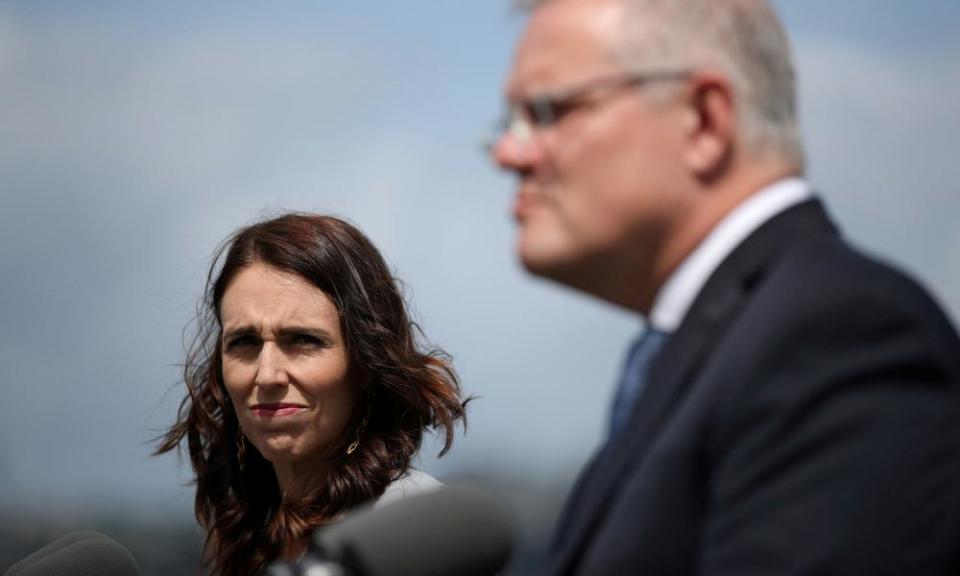Not much love actually: Jacinda Ardern was right to call out Australia's 'corrosive' policies

We’ve seen this movie before.
Then, in Love Actually, Hugh Grant played the unlikely prime minister of Britain, standing up to an oleaginous Billy Bob Thornton as president of the US.
This time, the backdrop was Sydney Harbour, and the champion of the underdog was New Zealand leader Jacinda Ardern. Scott Morrison was a cornered Australian prime minister, looking around for a ferry, a helicopter, anything, to transport him away: anywhere but here.
A smaller country – a junior partner – stood up to an aggressive, domineering senior one, and said: “I fear this has become a bad relationship.” In Ardern’s version: “This is corrosive to our relationship.”
Related: 'I was petrified': the New Zealanders deported from Australia despite decades working there
At issue is the deportation of New Zealand citizens – some of them Indigenous Australians, others raised and schooled in Australia and who have barely been to New Zealand – forcibly sent back to a country to which they have no connection after serving a prison sentence in Australia.
For many, their country of citizenship is a place they barely know, have no family in or connection to. Some are children still.
Ardern told Scott Morrison that Australia’s continued intransigence around the issue had become “corrosive” to the countries’ relationship.
“Australia is well within its rights to deport individuals who break your laws,” Ardern said. “New Zealand does the same. But we have a simple request – send back Kiwis. Genuine Kiwis. Do not deport your people and your problems.”
The issue has been a point of simmering tension between the two nations for years, but has erupted into fresh acrimony in recent weeks and become an election issue for Ardern after New Zealand police said the policy was a significant reason behind a rise in domestic criminal gang activity.
Ardern said her public evisceration was not without warning, having delivered to Morrison the same message in private. She said New Zealand would not stand for a lack of “fairness” in the relationship, citing cases of people who had moved to Australia when they were one week old being deported back to the land of their birth.
Morrison, for his part, was resolute.
“Our government is well known for our clear views on immigration and border security. If you have committed a crime and you’re not a citizen of Australia, then you have no right to stay.”
Ardern’s comments must be put in a broader political context. Adored abroad, Ardern has found the travails of domestic politics far more bruising, and finds herself locked in a fierce campaign battle ahead of a September poll.
Comments such as these will play strongly to a domestic audience, who will see a prime minister standing up to a bullying big brother.
But the broader principle of Ardern’s argument is also significant.
The people at the centre of this debate are undeniably “Australian” in the broader sense of a demos, even if they don’t carry the requisite paperwork. These people are products of Australia and are Australia’s responsibility.
Related: New Zealand lobby group plans to sue Australia over citizenship law change
Often, and all over the world, we see Australia seeking to shed itself of citizens it finds difficult, politically awkward, or unpopular. Australian infants and children trapped in the violence of al-Hawl in northern Syria are shunned because of the mistakes of their parents.
But countries are responsible for the people they create.
The people at the centre of this debate were, in many cases, raised and schooled entirely in Australia. They fell into crime – some of it petty, some of it serious – in Australia. They have all the family and friends they have ever known in Australia.
They are Australian, and they are Australia’s responsibility. Just as parents can’t spurn their children who behave badly, states can’t simply foist people they find difficult onto other countries.
The Australian government mounts arguments around national security and safety, but they are spurious, and made for the hackneyed political gain of being seen as tough on crime, and harsh towards “others”.
Rarely in international relations are there debates free of nuance, free of grey areas. But Australia is unambiguously in the wrong here, and it has been consistently for years.
Its inability to see the harm it is doing to what should be one of its closest, and simplest, relationships, is immensely damaging and self-defeating.

